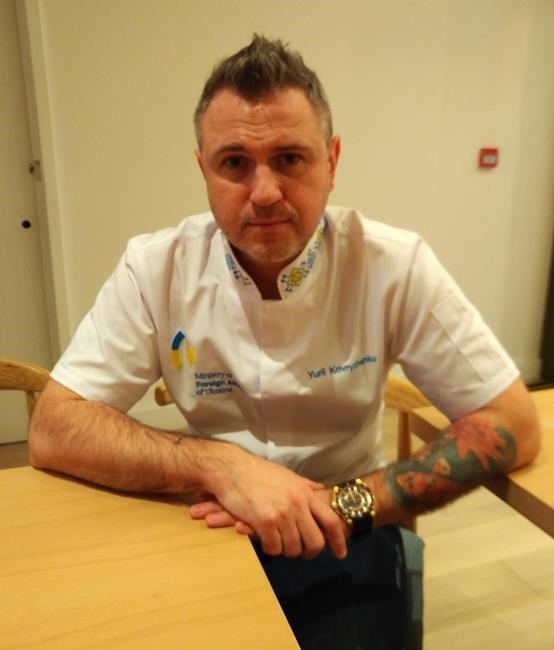One of Canada’s largest supermarket chains is taking a small but meaningful step to signal its support for Ukraine as the country defends itself against Russia's invasion.
Loblaw will change the name of its frozen President’s Choice-brand chicken Kiev, a dish of breaded chicken breast stuffed with herbs and butter, to chicken Kyiv, using the Ukrainian spelling.
"The product is currently being updated, and we expect to have new ones on (the) shelf later this summer," says Catherine Thomas, vice-president of communications at Loblaw, in a written statement.
Russia’s 2014 annexation of Crimea prompted the Ukrainian government to assert its own language and culture after years of Russian domination under the Soviet Union. Campaigns from the Ukrainian ministry of foreign affairs have largely convinced western governments and media outlets to refer to the country’s capital as Kyiv, following the Ukrainian spelling, transliterated from the Cyrillic alphabet, instead of Kiev, which is the Russian version.
Though the language campaign has been focused on the city, not the dish, other players in the food industry have adopted the change since February, when Russian forces launched their attacks on Ukraine and created a humanitarian crisis.
One early adopter of “chicken Kyiv” was Ricardo Larrivée, a Quebec chef who has hosted his own cooking show for more than 20 years. His website changed its spelling of the dish recipe on March 2, less than a week after the start of the war.
“We are sensitive to the current situation and it was important for us to show our solidarity with Ukrainians,” Nathalie Carbonneau, vice-president of communications at Larrivée’s company, Ricardo Media, said in an email.
In calling the dish “chicken Kyiv,” Loblaw joins several supermarket chains and food manufacturers in Australia and the United Kingdom that, following widespread calls on Twitter, have already changed their spelling.
Despite its name, chicken Kiev/Kyiv has neither Russian nor Ukrainian roots.
“It’s a French preparation,” says Darra Goldstein, professor emerita of Russian at Williams College in Williamstown, Mass., and author of six cookbooks, including two devoted to Russian (and Soviet) cuisine. “Starting in the mid-to-late 19th century, a lot of the aristocracy in Russia hired French chefs.”
These chefs brought to Russia the French à la Maréchale style of cooking meat, where a tender piece of meat is rolled in a mixture of bread crumbs and eggs, and then sautéed.
It’s not clear when chicken à la Maréchale was first stuffed with butter and renamed chicken Kiev.
Goldstein picks up the story in the 1920s, when she believes that chicken Kiev, as it then was, likely first made an appearance in the United States thanks to aristocratic Russian émigrés.
“Most Soviet sources claim it was invented in 1947 by the chef to the Ukrainian minister of foreign affairs, to celebrate his return from negotiations in Paris,” says Goldstein. It is unclear how reliable that claim is, she adds, because Ukraine was part of the Soviet Union in 1947, and the Soviet Union’s foreign minister in 1947 was ethnically Russian, not Ukrainian.
Yurii Kovryzhenko, a 38-year-old chef from Kyiv, points to a 1918 recipe from a restaurant in the city that he believes is the earliest chicken Kiev/Kyiv recipe. This version retains the bone of the wing, unlike the mass-produced, frozen varieties of chicken Kiev/Kyiv common in North America and the original chicken à la Maréchale.
Kovryzhenko first strips the bone of all of its meat and fat. He then wraps the breast around a mixture of butter, garlic, parsley and dill, and seals it with another strip of chicken meat to keep the buttery mixture from seeping out. He rolls it twice in flour, egg yolk and bread crumbs, deep fries it and finally bakes it until the skin is lightly bubbling. Diners pick up the bone using a paper frill.
He ardently advocates for the rechristening of chicken Kiev as chicken Kyiv in his role as a culinary ambassador for Ukraine. Prior to the Russian invasion, Kovryzhenko travelled the world showcasing Ukrainian gastronomy. He was in London, England for a food event when the war began on Feb. 24 and has not been able to use his return ticket since.
Instead, he is waging a culinary war from abroad. Much of his time is now devoted to organizing and cooking at fundraising dinners to support Ukrainian refugees. At one such event, he prepared varenyky — better known to Canadians by their Polish name, pierogis — with TV chef Jamie Oliver.
Kovryzhenko also helps non-Ukrainian restaurants design dishes that incorporate Ukrainian elements. A Japanese restaurant in London, for example, served udon with green borshch. Borshch (or, as Russians say it, borscht), a sour vegetable soup, is Ukraine’s national dish, even if it is often incorrectly assumed to be of Russian origin, say both Goldstein and Kovryzhenko.
Along with others, Kovryzhenko successfully lobbied two of the most prestigious restaurant guides, Michelin and the World’s 50 Best Restaurants, to suspend operations in Russia.
Most of all, Kovryzhenko wants the world to learn about Ukrainian food, and thereby, about Ukraine.
“The Russians took all the best dishes from the different republics of the Soviet Union,” he says. “But they don’t say it’s Georgian. They don’t say it’s Crimean Tatar. They don’t say it’s Ukrainian or Belarusian.”
Loblaw says chicken Kiev/Kyiv sales have increased this year. Kovryzhenko also predicts there will be a resurgence of interest in Ukrainian cuisine after the war is over. The restaurants he worked at in Ukraine, which served food from all over the world before the war, have recently closed down.
And while he had planned to open a Singaporean restaurant in Kyiv in March, the war cancelled and altered those plans.
“But I think when I return to Ukraine (after the war), I will open a Ukrainian restaurant again."
-Jeffrey Mo is an economist, public policy analyst and a former chemist and engineer, currently taking part in the Dalla Lana Fellowship in global journalism at the University of Toronto.
Jeffrey Mo, The Canadian Press



